宁波市初二英语上册期末知识点整理
八年级英语上册期末复习知识点
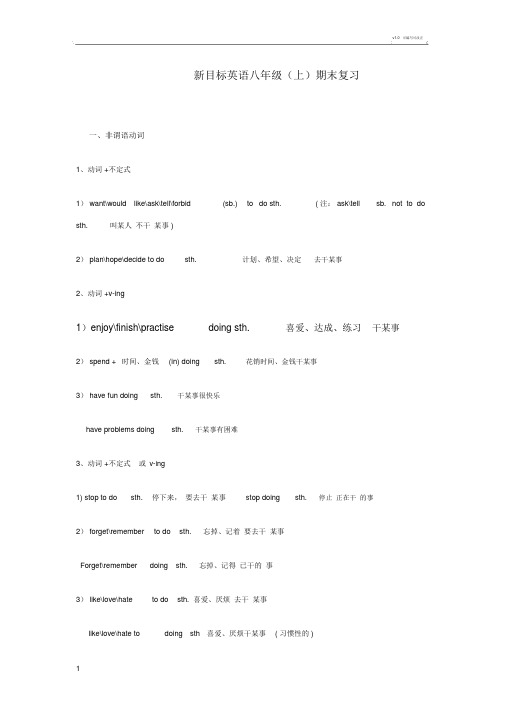
新目标英语八年级(上)期末复习一、非谓语动词1、动词 +不定式1) want\would like\ask\tell\forbid(sb.) to do sth.( 注: ask\tell sb. not to do sth.叫某人不干某事 )2) plan\hope\decide to do sth.计划、希望、决定去干某事2、动词 +v-ing1)enjoy\finish\practise doing sth.喜爱、达成、练习干某事2) spend +时间、金钱(in) doing sth.花销时间、金钱干某事3) have fun doing sth.干某事很快乐have problems doing sth.干某事有困难3、动词 +不定式或v-ing1) stop to do sth.停下来,要去干某事stop doing sth.停止正在干的事2) forget\remember to do sth.忘掉、记着要去干某事Forget\remember doing sth.忘掉、记得已干的事3) like\love\hate to do sth. 喜爱、厌烦去干某事like\love\hate to doing sth喜爱、厌烦干某事( 习惯性的 )4)start\begin to do或doing sth.开始干某事(两种表达意义差别不大)4、 make\let\help sb. do sth.使、让、帮助某人干某事5、 see\watch \ hear sb. do sth.看见、听见某人干某事(一般包括某事全过程)See\ watch \hear sb. doing sth.看见、听见某人正在干某事6、 It takes\took sb.+时间、金钱to do sth.某人花销时间、金钱去干某事=sb. spend时间、金钱 (in) doing on sth.二、形容词与副词1、形容词 +ly ---副词如: quick----quickly heavy----heavily1)形容词修饰名词、代词等,修饰不定代词时,放在不定代词以后。
初二英语期末上册要点

初二英语期末上册要点【导语】学业的精深成绩来源于勤奋好学,只有好学者,才能在无边的知识海洋里猎取到真智才学,只有真正勤奋的人才能克服困难,持之以恒,不断开辟知识的领域,武装自己的头脑,成为自己的主宰,让我们勤奋学习,持之以恒,成绩自己的人生,让自己的青春写满无悔!作者搜集的《初二英语期末上册要点》,期望对同学们有帮助。
1.初二英语期末上册要点形容词/副词的比较级和级 1. 形容词/副词的比较级和级的构成规则 (1)单音节词和少数以-er,-ow结尾的双音节单词,比较级在后面加-er,级在后面加-est。
① 单音节单词small→smaller→smallest short→shorter→shortesttall→taller→tallest great→greater→greatest ② 少数以-er,-ow结尾的双音节单词clever→cleverer→cleverestnarrow→narrower→narrowest (2)以不发音e结尾的单音节单词,比较级在原形后加-r,级在原级后加-st。
large→larger→largest nice→nicer→nicest able→abler→ablest (3)以一个辅音字母结尾的闭音节(即:辅音+元音+辅音)单词中,先双写末尾的辅音字母,比较级加-er,级加-est。
big→bigger→biggesthot→hotter→hottest fat→fatter→fattest (4)以“辅音字母+y”结尾的双音节词,把y改为i,比较级加-er,级加-est。
easy→easier→easiest heavy→heavier→heaviestbusy→busier→busiest happy→happier→happiest (5)其他双音节词和多音节词,比较级在前面加more,级在前面加most。
beautiful→more beautiful→most beautiful different→more different→most different easily→more easily→most easily (6)有少数形容词、副词的比较级和级是不规则的,必须熟记。
八年级上册英语归纳知识点
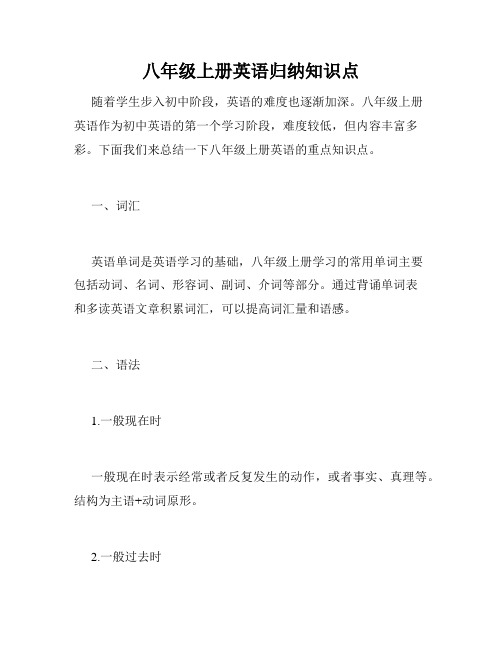
八年级上册英语归纳知识点随着学生步入初中阶段,英语的难度也逐渐加深。
八年级上册英语作为初中英语的第一个学习阶段,难度较低,但内容丰富多彩。
下面我们来总结一下八年级上册英语的重点知识点。
一、词汇英语单词是英语学习的基础,八年级上册学习的常用单词主要包括动词、名词、形容词、副词、介词等部分。
通过背诵单词表和多读英语文章积累词汇,可以提高词汇量和语感。
二、语法1.一般现在时一般现在时表示经常或者反复发生的动作,或者事实、真理等。
结构为主语+动词原形。
2.一般过去时一般过去时表示过去发生的动作,结构为主语+动词过去式。
通常在句子中还需要加上过去时间状语。
3.一般将来时一般将来时表示未来发生的动作或者状态。
结构为will/shall+动词原形。
如果主语为第二人称和第三人称,则用will+动词原形。
4.被动语态被动语态表示动作的承受者,结构为be+过去分词。
而且在被动语态中,主语通常是动作的承受者。
5.直接引语和间接引语直接引语是指说话人直接引用别人的话,通常使用引号来包含。
间接引语则是将别人的话间接转述。
需要注意的是,直接引语和间接引语的语调和用法不同。
三、阅读理解阅读理解是英语学习中重要的一部分,八年级上册英语中也包含了大量的阅读素材。
在阅读时,可以采用先理解整体,再分析段落的顺序,逐个分析细节,大概了解文章的中心思想。
四、写作技巧写作是英语学习的重要方面之一。
在写作时,需要做好以下几个方面的准备:明确写作的目的和受众,搜集相关的素材和信息,确定文体和语言风格,规划好文章结构和段落,用简练、清晰、有逻辑性的语言来表达观点。
总之,八年级上册英语的知识点众多,但通过系统的学习和练习,可以轻松掌握这一部分的知识。
同时,也要注重综合运用各种语言技能,提高自己的英语能力。
宁波市初二英语上册期末知识点总结

宁波市初二英语上册期末知识点整理Unit1知识梳理学生姓名:____________家长签字:____________ 【主题知识梳理答题必备】1. Where did you go on vacation? 你去哪里度假了?2. Did you buy anything special? 你买了什么特别的东西吗?3. Did you go anywhere interesting? 你去什么有趣的地方了码?4. We took quite a few photos there. 我们在那里拍了不少照片。
5. Ijust stayed at home most ofthe time to read and relax. 我大部分时间只是待在家里读书、休息。
6. Did everyone have a good time? 每个人都玩的很开心吗?7. The only problem was that there was nothing much to唯一的问题是晚上除了读书没什么事可做。
do in the evening but read.8. Still no one seemed to be bored. 虽然如此,好像没有人厌烦。
9. What activities do you find enjoyable? 你发现什么活动让人快乐?10. So we decided to go to the beach near our hotel. 因此我们决定去旅馆附近的海滩。
11. My sister and I tried paragliding. 我和姐姐尝试了滑翔伞运动。
12. I felt like I was a bird. 我感觉像一只鸟。
13. It wasso exciting! 这太令人兴奋了!14. I wonder what life was like here in the past. 我想知道过去这儿的生活是什么样的。
宁波效实中学初中英语八年级上册期末知识点(含答案解析)
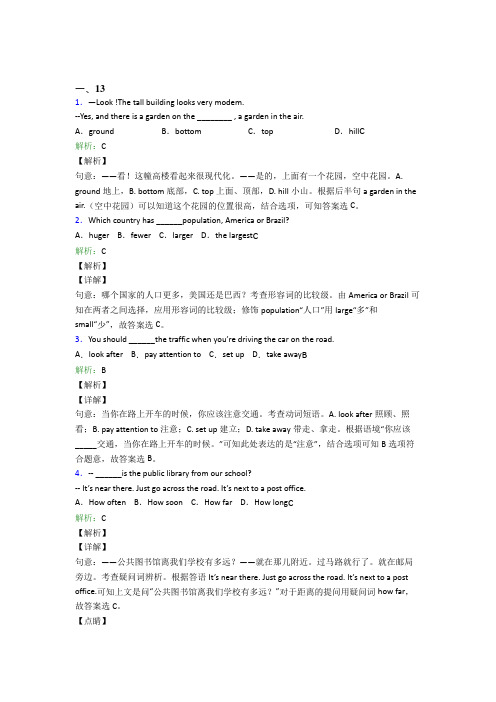
一、131.—Look !The tall building looks very modem.--Yes, and there is a garden on the ________ , a garden in the air.A.ground B.bottom C.top D.hill C解析:C【解析】句意:——看!这幢高楼看起来很现代化。
——是的,上面有一个花园,空中花园。
A. ground地上,B. bottom底部,C. top上面、顶部,D. hill小山。
根据后半句a garden in the air.(空中花园)可以知道这个花园的位置很高,结合选项,可知答案选C。
2.Which country has ______population, America or Brazil?A.huger B.fewer C.larger D.the largest C解析:C【解析】【详解】句意:哪个国家的人口更多,美国还是巴西?考查形容词的比较级。
由America or Brazil可知在两者之间选择,应用形容词的比较级;修饰population“人口”用large“多”和small“少”,故答案选C。
3.You should ______the traffic when you’re driving the car on the road.A.look after B.pay attention to C.set up D.take away B解析:B【解析】【详解】句意:当你在路上开车的时候,你应该注意交通。
考查动词短语。
A. look after照顾、照看;B. pay attention to注意;C. set up建立;D. take away带走、拿走。
根据语境“你应该_____交通,当你在路上开车的时候。
”可知此处表达的是“注意”,结合选项可知B选项符合题意,故答案选B。
4.-- ______is the public library from our school?-- It’s near there. Just go across the road. It’s next to a post office.A.How often B.How soon C.How far D.How long C解析:C【解析】【详解】句意:——公共图书馆离我们学校有多远?——就在那儿附近。
八年级上册英语期末知识点总结
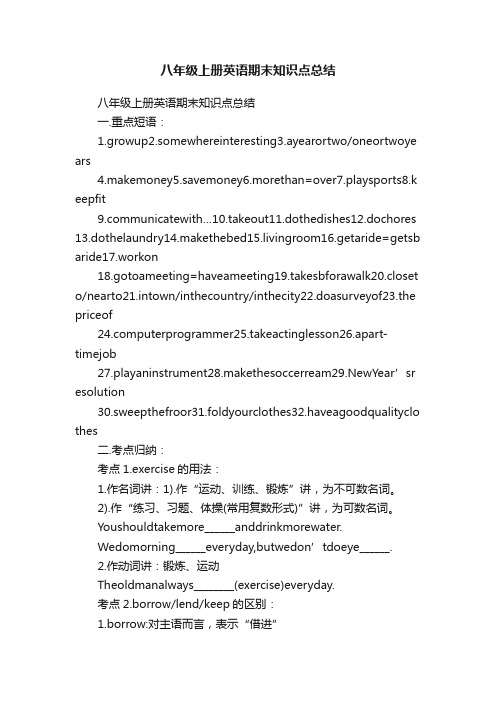
八年级上册英语期末知识点总结八年级上册英语期末知识点总结一.重点短语:1.growup2.somewhereinteresting3.ayearortwo/oneortwoye ars4.makemoney5.savemoney6.morethan=over7.playsports8.k eepfitmunicatewith…10.takeout11.dothedishes12.dochores 13.dothelaundry14.makethebed15.livingroom16.getaride=getsb aride17.workon18.gotoameeting=haveameeting19.takesbforawalk20.closet o/nearto21.intown/inthecountry/inthecity22.doasurveyof23.the priceofputerprogrammer25.takeactinglesson26.apart-timejob27.playaninstrument28.makethesoccerream29.NewYear’sr esolution30.sweepthefroor31.foldyourclothes32.haveagoodqualityclo thes二.考点归纳:考点1.exercise的用法:1.作名词讲:1).作“运动、训练、锻炼”讲,为不可数名词。
2).作“练习、习题、体操(常用复数形式)”讲,为可数名词。
Youshouldtakemore______anddrinkmorewater.Wedomorning______everyday,butwedon’tdoeye______.2.作动词讲:锻炼、运动Theoldmanalways________(exercise)everyday.考点2.borrow/lend/keep的区别:1.borrow:对主语而言,表示“借进”词组:borrowsbsth=borrowsthfromsb2.lend:对主语而言,表示“借出”词组:lendsbsth=lendsthtosb3.keep:借多长时间词组:keep+sth+for+一段时间注:borrow/lend的延续性动词是:keepMayI_____them_____you?=Couldyou______them______me?HowlongcanI______thebook?新年之后,初二下学期的意味着新的开始,新的冲刺。
人教版八年级上册英语 期末专训 词汇及语法填空专训

4. Justnowmymothertoldmetwointeresting________j_o_kes
(笑话).
5. Let'smakea________(决定)abouthowtogotothepark. 6. Mysisterisgoidnegctiossitoundy_________(教育)atauniversity.
5 schoolwork 10
5 culture 10 wonderful
(三) 1 sad
答案呈现
(四)
6 something 1 during 6 Although
2 finally 7 without 2 own 7 magazines
3 main 8 still
3 decide 8 Finally
I'mnotgoodatit.
However
15. Hisgrandpa________(死)fiveyearsago.
16. Don'ttalk________(大声地)inthelibrary. died
loudly
二、用方框中所给单词的适当形式填空, 每词仅用一次 (一) (宁波市镇海区期末)
答案呈现
(三) 1 went 2 afraid 3 prepare 4 until 5 us
(四) 1 similar 2 fact 3 difference 4 both 5 laughed
(五) 1 once
答案呈现
2 willhappen
3 moreoutgoing
4 famous
5 Although
(一) 1 an
四 (二) 6 What 1 harder
初二英语上册期末考试重点

初二英语上册期末考试重点1.初二英语上册期末考试重点情态动词can(能,会),may(可以,可能,或许),must(必需,肯定,应当)have to(必需,不得不)1.确定句结构:主语+can/may/must+动词原形+其它,例如:I must go now.2.否定句结构:在can/may/must后加not,例如:You mustn’t talk aloud in the library.3.一般疑问句结构:把can/may/must提在主语前,例如:Must you go now?(Yes,I must. No,I needn’t.)May I open the window?(Yes,you may. No,you needn’t.)pay,spend,cost,take的区分(1)pay花费(多少钱),主语是人。
sb. pay some money for sth.I paid 5000 yuan for the computer last week.我上个星期花了5000买电脑。
(2)spend花费(多少钱或时间),主语是人。
sb. spend some money on sth.sb. spend some time ( in ) doing sth.I spent 5000 yuan on the computer last week.She spent 2 hours ( in ) doing her homework.她花了2个小时做作业。
(3)cost花费(多少钱),主语是物。
sth. cost sb. some money.This jacket cost him 200 dollars.这件夹克衫花费她200美元。
(4)take花费(时间),主语形式主语为It.It takes sb. some time to do sth.花费某人多少时间做某事How long does it take sb. to do sth? 花费某人多少时间做某事?It took Liu Hong 2 hours to do her homework.刘红花了2个小时做作业。
宁波市初中英语八年级上册期末复习题(含答案)

一、131.Mr. Wu asked us __________a pair of trainers, because we would have to walk a long way. A.sellB.to sellC.wearD.to wear D解析:D【解析】【详解】句意:吴老师要求我们穿一双运动鞋,因为我们要走很长的路。
考查动词辨析和动词非谓语。
sell意思是“卖”,wear意思是“穿、戴”。
根据后面的because we would have to walk a long way.可知是吴老师要求我们穿一双运动鞋,所以排除A、B选项;ask sb.to do sth.“要求某人做某事”,所以排除C选项;故答案选D。
2.—Can you come to my party?— .A.Yes, I can’t B.Sorry,I can’tC.No,I can D.Sorry, I can B解析:B【详解】句意:——你能来参加我的聚会吗?——对不起,我不能。
考查应答语。
这里是表示邀请,Can you come to... ?的肯定回答为 Yes, I'd love to. 否定回答为 Sorry, I can't. 故选B项。
3.-_ ____?-“It's Thursday the 24th”A.How long does it take?B.When is your birthday?C.What time is it now ?D.What's today?D解析:D【详解】句意:-今天是什么日子?-今天是星期四,24号。
How long does it take?它花费多长时间;When is your birthday?你的生日在什么时候;What time is it now?现在几点了?What’s today?今天是什么日子?根据下面的回答It’s Thursday, the 24th可知,这个问题问的是“今天几月几日,星期几”,故应选D。
初二英语上册常考知识点归纳

初二英语上册常考知识点归纳初二英语上册常考知识点归纳初二上册的英语知识量比较多,想学好的学生要积极做好知识点的总结,课后要加强知识的复习。
下面是店铺为大家整理的初二英语上册常考知识点,希望对大家有用!初二英语上册知识点归纳情态动词的定义与基本用法:(一)情态动词的定义情态动词表示说话人对某一动作或状态的态度。
(二)情态动词的特点1)有一定词义; 2)不受主语人称和数的变化影响;3)与主要动词的'原形(或称不带to的不定式)一起构成谓语(除ought to作固定词组看待)。
(三)情态动词的分类和意义意义情态动词(四)情态动词的基本用法1. can (could)1)表示能力,could主要指过去时间。
Two eyes can see more than one. 两只眼比一只眼看得清。
Could the girl read she went to school? 这女孩上学前能识字吗?2)表示可能(理论上或是逻辑判断上)。
The temperature can fall to -60℃, that is 60℃ below freezing. 气温可降至-60℃,也就是零下60℃。
He can't (couldn't) have enough money for a new car. 他不可能有足够的钱买新车。
You mustn't smoke while you're walking around in the wood. You could start a fire. 在林子里走时勿吸烟,那样可能会引起火灾。
3)表示允许。
Can I have a look at your new pen? 我可以看一看你的新钢笔吗?He asked whether he could take the book out of the reading-room.他问他可不可以把书带出阅览室。
浙教版初二上册英语知识点总结

浙教版初二上册英语知识点总结一、重点短语1、be doing正在做2、be going to打算3、all kinds of各种各样的4、get to到达5、have a look看一看6、have a seat坐下7、get on上车8、get off下车9、wait for等候10、take a look看一看11、go to school去上学12、in the morning在上午13、in the afternoon在下午14、in the evening在晚上15、in the night在夜里16、at the same time同时17、in this way这样18、at first开始19、at the bus stop在公共汽车站。
20、what’s more而且。
21、not only…but also…不但……而且……22、from then on从那时起。
23、on one’s way to在某人的去路上。
24、during the school break在课间休息时。
25、as for/to/about至于/关于。
26、in a hurry匆忙。
27、from now on从现在起。
28、from then on从那时起。
29、from…to…从……到……30、at the age of在……岁时。
31、at the beginning of在……的开始。
32、at the end of在……的结尾/结束。
33、at the latest最迟。
34、at the same time同时。
35、at work在工作。
36、by the way顺便说一声。
37、call at some place访问某地。
38、call sb at+号码给某人打。
39、call on sb拜访某人。
40、come to a stop停止前进/运行。
41、come to school来上学。
初二英语上册知识点归纳
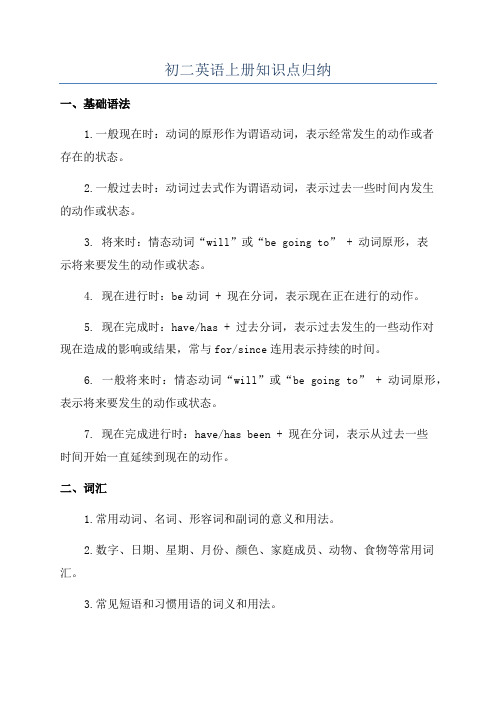
初二英语上册知识点归纳
一、基础语法
1.一般现在时:动词的原形作为谓语动词,表示经常发生的动作或者
存在的状态。
2.一般过去时:动词过去式作为谓语动词,表示过去一些时间内发生
的动作或状态。
3. 将来时:情态动词“will”或“be going to” + 动词原形,表
示将来要发生的动作或状态。
4. 现在进行时:be动词 + 现在分词,表示现在正在进行的动作。
5. 现在完成时:have/has + 过去分词,表示过去发生的一些动作对
现在造成的影响或结果,常与for/since连用表示持续的时间。
6. 一般将来时:情态动词“will”或“be going to” + 动词原形,表示将来要发生的动作或状态。
7. 现在完成进行时:have/has been + 现在分词,表示从过去一些
时间开始一直延续到现在的动作。
二、词汇
1.常用动词、名词、形容词和副词的意义和用法。
2.数字、日期、星期、月份、颜色、家庭成员、动物、食物等常用词汇。
3.常见短语和习惯用语的词义和用法。
三、阅读
1.理解主旨大意:根据文章标题和首尾句,获取文章的主旨大意。
2.猜测词义:通过上下文的线索猜测不懂的词语的意义。
3.阅读细节:根据文章中的细节信息回答问题。
4.推理判断:根据文章中的线索信息,做出合理的推理判断。
四、听力。
初二英语上册知识点 初二重要知识点总结

初二英语上册知识点初二重要知识点总结初二是英语学习的关键阶段,上册的知识点繁多且重要。
以下是对初二英语上册重要知识点的详细总结。
一、词汇1、名词掌握常见的可数名词和不可数名词的区分,如:apple(可数),water(不可数)。
学会名词所有格的用法,如:Tom's book(汤姆的书),teachers' office(教师办公室)。
2、动词一般过去时中动词的变化规则,包括规则动词(如:play played)和不规则动词(如:go went)。
动词不定式的用法,如:want to do sth(想要做某事)。
3、形容词和副词形容词和副词的比较级和最高级的构成及用法,例如:tall taller tallest。
形容词修饰名词,副词修饰动词、形容词或其他副词。
4、介词常见介词的用法,如:in,on,at,for,with 等。
掌握介词短语在句中的作用。
二、语法1、一般过去时了解一般过去时的概念,表示过去发生的动作或存在的状态。
学会用一般过去时的陈述句、疑问句及其回答。
注意时间状语的搭配,如:yesterday,last week,two days ago 等。
2、频度副词常见的频度副词有 always,usually,often,sometimes,seldom,never 等。
掌握频度副词在句中的位置,通常位于实义动词之前,be 动词、助动词或情态动词之后。
3、形容词和副词的比较级和最高级比较级用于两者之间的比较,最高级用于三者或三者以上的比较。
比较级的标志词有 than,最高级前通常加 the。
4、宾语从句掌握宾语从句的语序,要用陈述句语序。
注意宾语从句的时态,要根据主句的时态来确定从句的时态。
1、“There be”句型表示“某地有某物”,There be 句型中的 be 动词要根据后面的名词单复数来确定。
如:There is a book on the desk There are some apples in the basket2、祈使句表示命令、请求、建议等,以动词原形开头。
八年级期末上册英语知识点

八年级期末上册英语知识点As the end of the first semester of eighth grade approaches, it's important to review the various English language concepts that have been covered throughout the year. From grammar and vocabulary to reading comprehension and writing skills, there are many topics that students should be familiar with in order to succeed in language arts class and beyond.1. Parts of SpeechOne of the fundamental building blocks of English grammar is an understanding of the different parts of speech. These include:- Nouns: the names of people, places, things, or ideas- Verbs: action words that express what a subject is doing or being - Adjectives: words that describe or modify nouns- Adverbs: words that describe or modify verbs, adjectives, or other adverbs- Pronouns: words that stand in for nouns- Prepositions: words that show relationships between different parts of a sentence- Conjunctions: words that connect clauses, phrases, or words together- Interjections: words that express strong emotions or reactions2. Verb TensesIn addition to understanding what verbs are, it's important to be able to use them correctly in different tenses. These include:- Present tense: describes actions that are happening now- Past tense: describes actions that happened in the past- Future tense: describes actions that will happen in the future- Present perfect tense: describes actions that started in the past but continue to the present- Past perfect tense: describes actions that were completed before another event in the past- Future perfect tense: describes actions that will be completed before another event in the future3. VocabularyExpanding your vocabulary is essential to improving your language skills. Consider studying and using:- Synonyms: different words with the same or similar meanings- Antonyms: words with opposite meanings- Homophones: words that sound the same but have different meanings and spellings- Homonyms: words that are spelled and pronounced the same but have different meanings- Idioms: phrases with meanings that can't be understood through the literal meanings of each individual word4. Reading ComprehensionBeing able to read and understand written texts is crucial for success in both school and later life. To improve reading comprehension, students should consider:- Identifying main ideas and supporting details- Making inferences based on what's been read- Understanding the author's purpose and point of view- Recognizing literary devices like foreshadowing, metaphor, and simile- Analyzing character development, plot, and setting in fictional works5. Writing SkillsHaving strong writing skills is important for academic success and beyond. Key elements to focus on include:- Organization: clearly outlining the main idea and supporting details in a logical order- Sentence structure: creating varied sentence structures to add interest and depth to writing- Use of evidence: citing and integrating evidence into writing to support claims- Conventions: using correct punctuation, spelling, and grammar to ensure writing is clear and effectiveIn conclusion, mastering the above concepts is essential for success in English language arts, both in eighth grade and beyond. By reviewing and practicing these skills, students can build a strong foundation that will serve them well in future academic and professional pursuits.。
初二英语上册知识点归纳总结

初二英语上册知识点归纳总结初二英语上册知识点归纳重点句型和短语一、 have fun doing sth.句型介绍意为\"做某事有乐趣\",其中have fun 相当于enjoy oneself,表示过得愉快。
1. 英语中的集体名词,如family, class, team等作主语时,若作为一个整体看,其后的谓语动词用单数;若强调其组成成员,谓语动词用复数。
如:My family is a happy one. 我家是个幸福的家庭。
My family are all watching TV. 我们全家人都在看电视。
2. 在比较级中,要注意than后面人称代词的格。
1)当句子中的谓语动词是不及物动词时,than后面的.代词用主格还是宾格,在意思上通常没有区别。
如:He runs faster than I / me. 他跑得比我快。
They get to school earlier than we / us every day. 他们每天都比我们到校早。
2)当句中的谓语动词是及物动词时,than后面的人称代词用主格还是宾格在意思上就有差别了。
试比较:I like you more than he. (=I like you more than he likes you.) 我比他更喜欢你。
I like you more than him. (=I like you more than I like him.) 你和他相比,我更喜欢你。
3. 不定式作定语时,应放在被修饰词的后面,一般指一个还没有发生的动作。
如:Do you have anything to say about this? 有关这件事你有没有什么要说的?4. 在比较句型中,than后面的谓语动词常常省略。
也可以用相应的助动词来代替与前面相同的谓语动词,以避免重复。
如:Tom does better at the lessons than I (do). 汤姆功课比我好。
八年级上册英语知识点总结

八年级上册英语知识点总结这篇文章给大家分享一些八年级上册重要的英语知识点,一起看一下具体内容有哪些。
八年级上册重要短语on vacation 去度假stay at home 待在家quiet a few 很多most of 大多数decide to do 决定做某事feel like 感受到hardly ever几乎从不stay up late 熬夜close to 接近so far 到目前为止want to do 想要做某事keep on doing 继续做某事make sure 确保pour...into,把……倒入……mix...up... 混合起来change...into... 把……变成……be glad to 很高兴prepare for 为...做准备hear from sb. 收到某人的来信have enough time to do有足够时间去做e afraid to do 害怕去做in the end 最后一般过去时表示在过去某个时候发生的动作或存在的状态,也表示在过去某段时间里经常发生的习惯性动作。
1.肯定形式:主语+动词过去式+其它。
2.否定形式:主语+didn't +谓语动词原形+其它。
3.一般疑问句:①Did+主语+谓语动词原形+其它?②Was/Were+主语+表语?4.特殊疑问句:疑问词+ did+主语+动词原形+其它?5.一般过去时记忆口诀一般过去时并不难,过去动作、状态记心间。
动词要用过去式,时间状语句末站。
否定句很简单,didn't 站动原前,其它部分不要变。
一般疑问句也好变,did放句子前,主语、动原、其它部分依次站立。
特殊疑问句也简单,疑问词加一般疑问句记心间。
一般过去时表示过去某个时间或某一段时间内发生的动作或存在的状态,常和过去的时间状语连用。
比较级单音节形容词和部分双音节词(大多是以y、ly、er结尾的双音节形容词),一般在词尾加-er。
八年级上册英语知识点总结
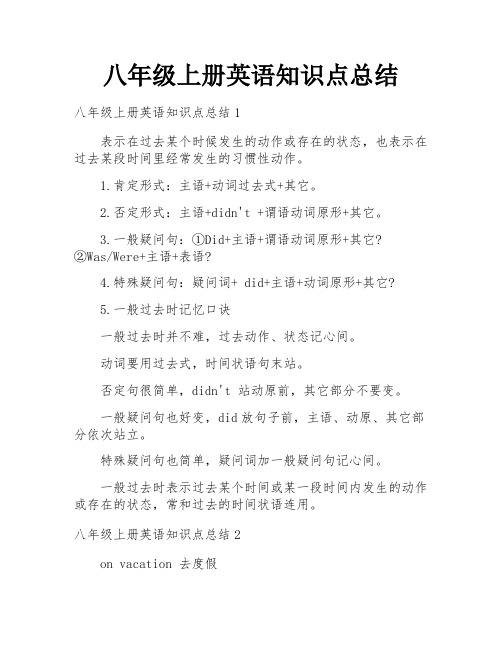
八年级上册英语知识点总结八年级上册英语知识点总结1表示在过去某个时候发生的动作或存在的状态,也表示在过去某段时间里经常发生的习惯性动作。
1.肯定形式:主语+动词过去式+其它。
2.否定形式:主语+didn't +谓语动词原形+其它。
3.一般疑问句:①Did+主语+谓语动词原形+其它?②Was/Were+主语+表语?4.特殊疑问句:疑问词+ did+主语+动词原形+其它?5.一般过去时记忆口诀一般过去时并不难,过去动作、状态记心间。
动词要用过去式,时间状语句末站。
否定句很简单,didn't 站动原前,其它部分不要变。
一般疑问句也好变,did放句子前,主语、动原、其它部分依次站立。
特殊疑问句也简单,疑问词加一般疑问句记心间。
一般过去时表示过去某个时间或某一段时间内发生的动作或存在的状态,常和过去的时间状语连用。
八年级上册英语知识点总结2on vacation 去度假stay at home 待在家quiet a few 很多most of 大多数decide to do 决定做某事feel like 感受到hardly ever几乎从不stay up late 熬夜close to 接近so far 到目前为止want to do 想要做某事keep on doing 继续做某事make sure 确保pour...into,把……倒入……mix...up... 混合起来change...into... 把……变成……be glad to 很高兴prepare for 为...做准备hear from sb. 收到某人的来信have enough time to do有足够时间去做e afraid to do 害怕去做in the end 最后八年级上册英语知识点总结3语法:一. 一般将来时:一般将来时表示将来某一时刻的动作或状态,或将来某一段时间内经常的动作或状态。
常常和表示将来的时间状语连用。
英语初二上册知识点
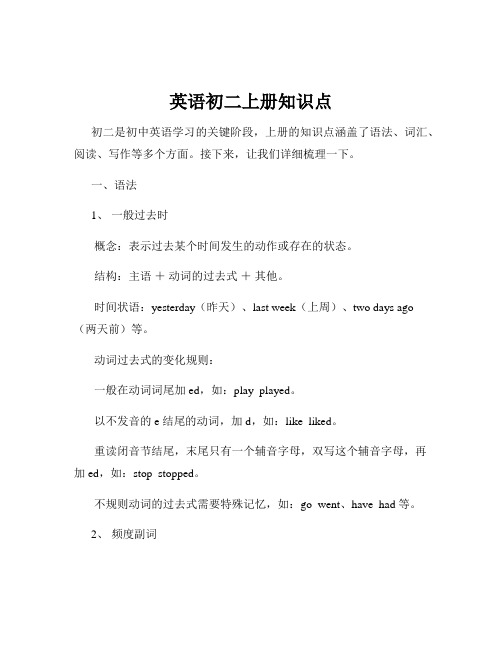
英语初二上册知识点初二是初中英语学习的关键阶段,上册的知识点涵盖了语法、词汇、阅读、写作等多个方面。
接下来,让我们详细梳理一下。
一、语法1、一般过去时概念:表示过去某个时间发生的动作或存在的状态。
结构:主语+动词的过去式+其他。
时间状语:yesterday(昨天)、last week(上周)、two days ago(两天前)等。
动词过去式的变化规则:一般在动词词尾加 ed,如:play played。
以不发音的 e 结尾的动词,加 d,如:like liked。
重读闭音节结尾,末尾只有一个辅音字母,双写这个辅音字母,再加 ed,如:stop stopped。
不规则动词的过去式需要特殊记忆,如:go went、have had 等。
2、频度副词常见的频度副词有:always(总是)、usually(通常)、often(经常)、sometimes(有时)、seldom(很少)、never(从不)。
频度副词在句中的位置通常在 be 动词、助动词、情态动词之后,实义动词之前。
3、形容词和副词的比较级和最高级比较级的构成规则:单音节词和少数双音节词,一般在词尾加 er,如:tall taller。
以不发音的 e 结尾的单音节词,直接加 r,如:nice nicer。
重读闭音节词,末尾只有一个辅音字母,双写这个辅音字母,再加er,如:big bigger。
以“辅音字母+y”结尾的双音节词,把 y 变为 i,再加 er,如:heavy heavier。
多音节词和部分双音节词,在词前加 more,如:beautiful more beautiful。
最高级的构成规则:单音节词和少数双音节词,一般在词尾加 est,如:tall tallest。
以不发音的 e 结尾的单音节词,直接加 st,如:nice nicest。
重读闭音节词,末尾只有一个辅音字母,双写这个辅音字母,再加est,如:big biggest。
以“辅音字母+y”结尾的双音节词,把 y 变为 i,再加 est,如:heavy heaviest。
八年级上册英语知识总结
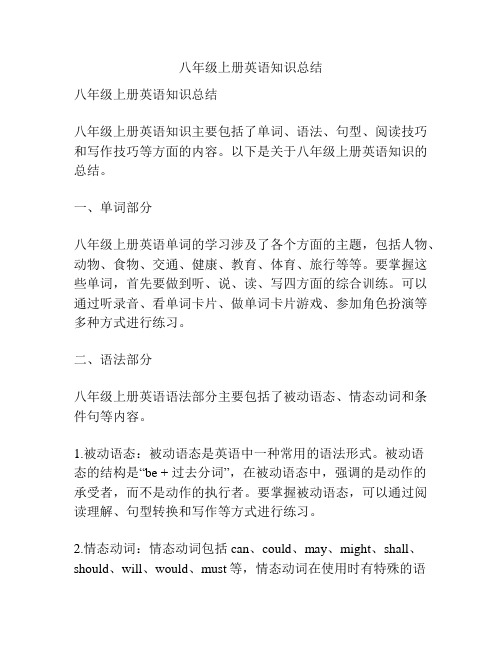
八年级上册英语知识总结八年级上册英语知识总结八年级上册英语知识主要包括了单词、语法、句型、阅读技巧和写作技巧等方面的内容。
以下是关于八年级上册英语知识的总结。
一、单词部分八年级上册英语单词的学习涉及了各个方面的主题,包括人物、动物、食物、交通、健康、教育、体育、旅行等等。
要掌握这些单词,首先要做到听、说、读、写四方面的综合训练。
可以通过听录音、看单词卡片、做单词卡片游戏、参加角色扮演等多种方式进行练习。
二、语法部分八年级上册英语语法部分主要包括了被动语态、情态动词和条件句等内容。
1.被动语态:被动语态是英语中一种常用的语法形式。
被动语态的结构是“be + 过去分词”,在被动语态中,强调的是动作的承受者,而不是动作的执行者。
要掌握被动语态,可以通过阅读理解、句型转换和写作等方式进行练习。
2.情态动词:情态动词包括can、could、may、might、shall、should、will、would、must等,情态动词在使用时有特殊的语法规则和用法,掌握这些用法是十分重要的。
可以通过填空练习、句型转换和阅读理解等方式进行练习。
3.条件句:条件句由一个条件从句和一个主句组成,主要包括了三种类型:一般条件句、真实条件句和虚拟条件句。
在学习条件句时,需要注意各种条件句的句型结构和用法。
可以通过做句型转换、填空练习和写作等方式进行练习。
三、句型部分八年级上册英语句型部分主要包括了动词不定式、动名词和其他短语的用法。
1.动词不定式:动词不定式通常由to + 动词原形构成,可以作主语、表语、宾语和宾补等,也可以与一些动词连用构成固定搭配。
常见的动词不定式用法有情态动词+动词不定式、动词+动词不定式、be+形容词+动词不定式等。
要掌握动词不定式的用法,可以通过阅读理解、句型转换和写作等方式进行练习。
2.动名词:动名词是动词变成名词的形式,通常以-ing结尾,可以作主语、表语、宾语和宾补等。
要掌握动名词的用法,可以通过填空练习、句型转换和写作等方式进行练习。
初二英语(八年级)上册期末知识点归纳(2).doc
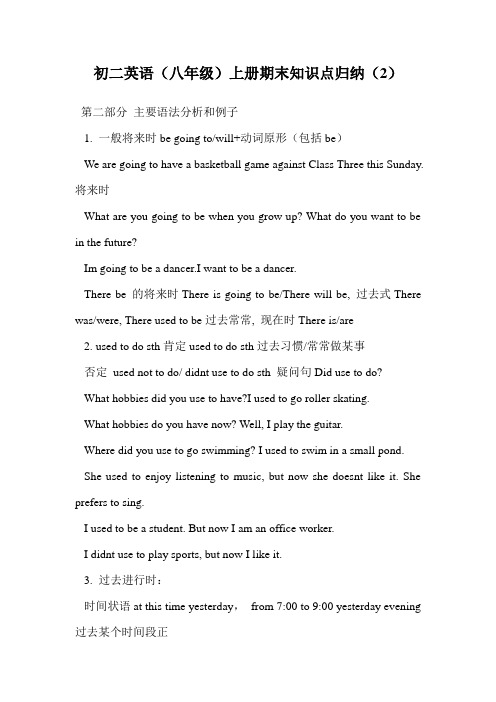
初二英语(八年级)上册期末知识点归纳(2)第二部分主要语法分析和例子1. 一般将来时be going to/will+动词原形(包括be)We are going to have a basketball game against Class Three this Sunday.将来时What are you going to be when you grow up? What do you want to be in the future?Im going to be a dancer.I want to be a dancer.There be 的将来时There is going to be/There will be, 过去式There was/were, There used to be过去常常, 现在时There is/are2. used to do sth肯定used to do sth过去习惯/常常做某事否定used not to do/ didnt use to do sth 疑问句Did use to do?What hobbies did you use to have?I used to go roller skating.What hobbies do you have now? Well, I play the guitar.Where did you use to go swimming? I used to swim in a small pond. She used to enjoy listening to music, but now she doesnt like it. She prefers to sing.I used to be a student. But now I am an office worker.I didnt use to play sports, but now I like it.3. 过去进行时:时间状语at this time yesterday,from 7:00 to 9:00 yesterday evening 过去某个时间段正What were you doing at this time yesterday?I was taking a shower/bath. What was Michael doing from 7:00 to 9:00 yesterday evening?He was reading.4. 一般情况下,when+一般现在时/过去时,while+现在/过去进行时The telephone rings while Jane is practising the violin.=When the telephone rings, Jane is practising the violin.(while后接持续性动作,When接短暂性动作, 响铃只是瞬间的动作。
- 1、下载文档前请自行甄别文档内容的完整性,平台不提供额外的编辑、内容补充、找答案等附加服务。
- 2、"仅部分预览"的文档,不可在线预览部分如存在完整性等问题,可反馈申请退款(可完整预览的文档不适用该条件!)。
- 3、如文档侵犯您的权益,请联系客服反馈,我们会尽快为您处理(人工客服工作时间:9:00-18:30)。
宁波市初二英语上册期末知识点整理Unit1知识梳理学生姓名:____________家长签字:____________ 【主题知识梳理答题必备】1. Where did you go on vacation? 你去哪里度假了?2. Did you buy anything special? 你买了什么特别的东西吗?3. Did you go anywhere interesting? 你去什么有趣的地方了码?4. We took quite a few photos there. 我们在那里拍了不少照片。
5. Ijust stayed at home most ofthe time to read and relax. 我大部分时间只是待在家里读书、休息。
6. Did everyone have a good time? 每个人都玩的很开心吗?7. The only problem was that there was nothing much to唯一的问题是晚上除了读书没什么事可做。
do in the evening but read.8. Still no one seemed to be bored. 虽然如此,好像没有人厌烦。
9. What activities do you find enjoyable? 你发现什么活动让人快乐?10. So we decided to go to the beach near our hotel. 因此我们决定去旅馆附近的海滩。
11. My sister and I tried paragliding. 我和姐姐尝试了滑翔伞运动。
12. I felt like I was a bird. 我感觉像一只鸟。
13. It wasso exciting! 这太令人兴奋了!14. I wonder what life was like here in the past. 我想知道过去这儿的生活是什么样的。
15. I really enjoyed walking around the town. 我真的很享受在这个镇上到处走走。
16. We wanted to walk up to the top, but then it startedraining a little so we decided to take the train. 我们想步行爬到山顶,但是天开始下起了小雨,因此我们决定乘坐火车。
17. And because of the bad weather, we couldn’t seeanything below. 并且因为糟糕的天气,底下的东西我们什么都看不到。
18. Because we forgot to bring an umbrella. 因为我们忘了带雨伞。
19. My legs were so tired that I wanted to stop. 我的腿太累了以至于我想停下来。
20. Everyone jumped up and down in excitement. 大家都兴奋地上下跳跃。
Unit2知识梳理学生姓名:____________家长签字:____________ 【主题知识梳理答题必备】1. My little brother often helps with housework at home. 我弟弟经常在家帮忙做家务。
2. I use a knife to cut bread. 我用刀切面包。
3. Her life is so full that she doesn’t have time for hobbies. 她的生活太忙了,以至于她没有时间培养业余爱好。
4. Oh, I have to play tennis with my friends. 奥,我得和我的朋友们打网球。
5. I go to the movies maybe once a month. 我大概每月去看一次电影。
6. How often do they stay up late? 他们多久熬一次夜?7. He plays at least twice a week. 他至少每周踢两次(球)。
8. She says it’s good for my health. 她说它(牛奶)对我的健康有好处。
9. Last month we asked our students about their free time activities. 上个月我们询问了学生们关于他们的业余活动的情况。
10. We found that only fifteen percent of our studentsexercise every day.我们发现仅有15%的学生每天锻炼。
11. And twenty percent do not exercise at all! 并且20%的学生根本不锻炼。
12. The answers to our questions about watchingtelevision were also interesting.对我们提出的有关看电视的问题也颇有意思。
13. Although many students like to watch sports, game shows are the most popular. 尽管很多学生喜欢看运动类节目,但游戏类节目是最受欢迎的。
14.It is good to relax by using the internet or watching game shows, but we think the best way to relax is through exercise. 上网或看游戏类节目是很好的放松方式,但我们认为放松的最好方式是通过锻炼。
15.It is healthy for the mind and the body. 它对身心健康有益。
16. Don’t spend too much time watching TV. 不要把太多的时间花在看电视上。
17. However, she has some bad habits, too. 然而,她也有一些坏习惯。
18. She usually watches TV for more than two hours aday.她通常每天看两个多小时的电视。
19. She never goes to the dentist for teeth cleaning. 她从不为牙齿清洁去看牙医。
20. Almost every day. 几乎每天。
Unit3知识梳理学生姓名:____________家长签字:____________ 【主题知识梳理答题必备】1. BothTom and Jerry can play the drums, but Jerryplays them better than Tom.汤姆和杰瑞都会敲鼓,但是杰瑞比汤姆敲得好。
2. The girl came into the classroom quietly. 女孩静静地走进了教室。
3. He is a hard-working boy. 他是一个勤奋的男孩。
4. He always works hard. 他总是努力地工作。
5. Lucy isn’t as outgoing as Mary. 露西不如玛丽外向。
6. I think she sang more clearly than Lisa. 我认为她比丽萨唱得更清晰。
7. But the most important thing is to learn somethingnew and have fun.但是最重要的是学到一些新东西并获得乐趣。
8. The boy is talented in dancing. 这个男孩很有舞蹈天赋。
9. The teacher made me answer this difficult question. 老师让我回答这个难题。
10. I’m quieter and more serious than most kids. 我比大多数孩子更文静、更稳重。
11. That’s why I like reading books and I study harder in class. 这便是我喜欢看书而且在班上学习更加努力的原因。
12. I’m shy so it’s not easyfor me to make friends. 我很腼腆,因此对我来说交朋友不是很容易。
13. You don’t need a lot of them as long as they’regood.不在多而贵在好。
14. Larry is much less hard-working, though. 不过,拉里学习不那么勤奋。
15. I don’t really care if my friends are the same as meor different.我并不十分在乎我的朋友跟我一样或与我不同。
16. I broke my arm last year but she made me laugh and feel better. 去年我摔断了胳膊,但她逗我开怀大笑,并让我感觉好起来。
17. I’m different from Jeff because I’m louder than the other kids in my class. 我与杰夫不同,因为在班里我比其他的孩子声音更响亮。
18. My best friend is similar to Larry. 我最好的朋友与拉里相似。
19. He is different from his brother. They have somedifferences.他与他的弟弟不同。
他们有一些不同点。
20. It’s important for a student to read some goodbooks.对学生来说读些好书是很重要的。
Unit4知识梳理学生姓名:____________家长签字:____________ 【主题知识梳理答题必备】1.My home is very close to the school. 我家离学校很近。
2. The DJs choose songs the most carefully. 音乐节目主持人挑选歌曲最细致。
3. How do you like it so far? 到目前为止,你认为这里怎么样?4. Thanks for telling me. 谢谢你告诉我。
